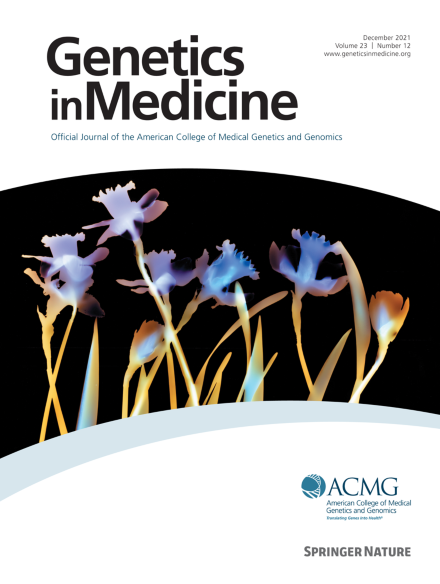Monogenic disorders associated with motor speech phenotypes in children and adolescents undergoing clinical exome sequencing
IF 6.6
1区 医学
Q1 GENETICS & HEREDITY
引用次数: 0
Abstract
Purpose
Prior studies investigating the genetic architecture of pediatric motor speech disorders (MSDs) have been limited by small sample sizes and an exclusive focus on apraxia. We aimed to identify pathogenic genomic variants associated with MSDs in a large pediatric population referred for exome sequencing (ES).
Methods
We identified pediatric patients with MSDs who had clinical ES between 2012 and 2022. The rate of pathogenic/likely pathogenic (P/LP) findings considered causative of the MSD phenotype was determined and delineated by sex and neurodevelopmental comorbidity. Gene-based burden testing compared the rate of P/LP variants in each gene in MSD cases with a comparison clinical ES cohort.
Results
Positive diagnostic results were detected in 527 of 2004 (26.3%) patients with MSDs, with higher diagnostic rates in females and individuals with neurodevelopmental comorbidities. P/LP sequence variants were detected in 262 genes. Gene-based case-referent burden analysis revealed that 30 genes were nominally associated with MSDs, 2 of which (SETBP1 and ADCY5) survived exome-wide correction.
Conclusion
Over 25% of patients with MSDs were found to harbor P/LP variants in 262 genes, many of which have not previously been associated with MSDs. Potential clinical implications include early implementation of intensive speech therapy for children diagnosed with monogenic causes of MSDs.
求助全文
约1分钟内获得全文
求助全文
来源期刊

Genetics in Medicine
医学-遗传学
CiteScore
15.20
自引率
6.80%
发文量
857
审稿时长
1.3 weeks
期刊介绍:
Genetics in Medicine (GIM) is the official journal of the American College of Medical Genetics and Genomics. The journal''s mission is to enhance the knowledge, understanding, and practice of medical genetics and genomics through publications in clinical and laboratory genetics and genomics, including ethical, legal, and social issues as well as public health.
GIM encourages research that combats racism, includes diverse populations and is written by authors from diverse and underrepresented backgrounds.
 求助内容:
求助内容: 应助结果提醒方式:
应助结果提醒方式:


